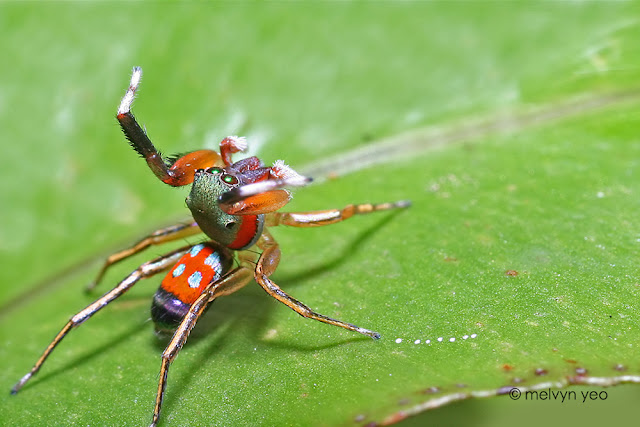Opiliones (formerly Phalangida) are an order of arachnids commonly known as harvestmen. As of 2006, over 6,400 species of harvestmen have been discovered worldwide, although the real number of extant species may exceed 10,000.
Thursday, 20 October 2011
Harvestman, Opiliones
Tuesday, 11 October 2011
Robberflies, Asilidae
 |
| Hanging Thief Robber Fly |
Insects in the Diptera family Asilidae are commonly called robber flies. The family Asilidae contains about 7,100 described species worldwide.
Monday, 10 October 2011
Jumping Spiders
The jumping spider family (Salticidae) contains more than 500 described genera and about 5,000 described species, making it the largest family of spiders with about 13% of all species. Jumping spiders have good vision and use it for hunting and navigating.
Singapore Tarantula, Phlogiellus inermis
Octurnal. Hides in silk-lined spaces among leaf litter. When disturbed, the spider will adopt a threat posture by lifting its cephalothorax and spreading its jaws and first two pairs of legs.
Labels:
Phlogiellus inermis,
Singapore Tarantula
Spiny Orb Weavers, Gasteracantha
 |
| Curved Spiny Spider (Gasteracantha arcuata) |
Spiny orb-weavers is a common name for Gasteracantha, a genus of spiders. They are also commonly called Spiny-backed orb-weavers, due to the prominent spines on their abdomen. These spiders can reach sizes of up to 30mm in diameter (measured from spike to spike). Although their shell is shaped like a crab shell with spikes, it is not to be confused with a crab spider.
Labels:
Gasteracantha,
Spiny Orb Weavers
Saturday, 8 October 2011
Weevils
A weevil is any beetle from the Curculionoidea superfamily. They are usually small, less than 6 millimetres (0.24 in), and herbivorous.
Dead Leaf Mantis
This species of praying mantis is always brown, but the shade of brown may vary between individuals. Their brown color is not solid all over, but it has dark and light spots to mimic a dead leaf.
Net Casting Spider
The spider family Deinopidae consists of stick-like elongate spiders that build unusual webs that they suspend between the front legs.
Labels:
Net casting Spider,
ogre-faced spiders
Heteropoda venatoria
Heteropoda venatoria with egg |
The brown huntsman spider, Heteropoda venatoria, is found in many tropical and subtropical parts of the world, including Asia, some Mascarene and Caribbean islands, the Southeastern US, and (especially) Australia.
Pseudoscorpion
| Pseudoscorpion attacking weaver ant |
Scorpions
| Scorpion eating Earwig |
Trilobite Larvae
| Trilobite larvae |
Lichen Huntsman (Heteropoda Boiei)
| Heteropoda Boiei (Permai Rainforest Resort) |
As adults, huntsman spiders do not build webs, but hunt and forage for food.
Labels:
Heteropoda Boiei
Whip Scorpion
Found a dead Whip Scorpion at Permai Rainforest Resort. First time seeing one!
Thelyphonida is an arachnid order comprising invertebrates commonly known as vinegaroons (or vinegarroons).
Whip Spiders, Amblypygi
| 10mm long |
Amblypygi is an order of invertebrate animals belonging to the class Arachnida, in the subphylum Chelicerata of the phylum Arthropoda.They form a separate order of arachnids alongside the spiders, scorpions and others.
Scorpion Tailed Spider, Arachnura sp.
| Female Scorpion Tailed Spider, Arachnura sp. 10mm |
The Scorpion Tailed Spider body has various shades of brown but most commonly fawn, with a black tip on the end of the abdomen.
Pasilobus sp. (Bird-Dropped Spider)
Labels:
Bird-Dropped Spider,
Pasilobus sp
Friday, 7 October 2011
Sucking Millipede
| Sucking Millipede |
There are 4 main types of millipedes in the world, Cylinder Millipedes, Plated Millipedes, Pill Millipedes and Bristly Millipedes.
Thursday, 6 October 2011
Treehopper
| TreeHoppers with young |
Treehoppers (more precisely typical treehoppers to distinguish them from the Aetalionidae) and thorn bugs are members of the family Membracidae, a group of insects related to the cicadas and the leafhoppers.
Golden Tortoise Beetle
Centipedes
Centipedes (from Latin prefix centi-, "hundred", and pes, pedis, "foot") are arthropods belonging to the class Chilopoda of the subphylum Myriapoda.
Hammerhead Worm
Subscribe to:
Comments (Atom)




